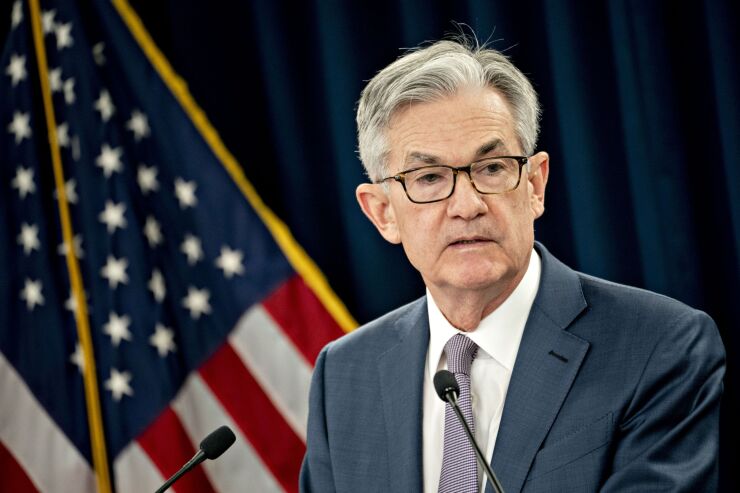
Federal Reserve Chair Jerome Powell came under fire by Democratic lawmakers on his response to the pandemic to help local governments struggling with serious fiscal challenges related to the public health crisis.
During one of three hearings this week in which Powell will be testifying, he told the House Financial Services Committee on Tuesday that the Fed’s Municipal Liquidity Facility is working and increasingly opened up the private markets to invest in municipal bonds. Treasury Secretary Steven Mnuchin also testified.
“What that facility has accomplished is it opened up the private market so state and local governments are borrowing in record amounts at record low yields,” Powell told lawmakers.
Democratic lawmakers have said the MLF needs to be open to more municipalities and that the program should offer lower rates.
The MLF is open to counties with populations of 500,000 or more and cities of 250,000 or more. In June, the central bank allowed U.S. states to be able to have at least two cities or counties eligible to directly issue notes through the MLF regardless of population. Governors of each state are also now able to designate two issuers whose revenues are derived from activities such as public transit and tolls. Territories like Guam and Puerto Rico are not eligible.
Two issuers have used the program, leading some lawmakers to believe the MLF is not successful. However, the Fed said the program is meant to be a backstop to help the market function properly, leading to a fundamental divide on how the MLF should help state and local governments.
“Just looking at what happened in the city of Detroit,” Tlaib said, referencing the city's July 2013 bankruptcy declaration, “I’m really worried that we’re not being flexible enough.”
Powell said issuers are able to borrow in the municipal market at lower rates than the MLF offers.
In June, Reps. Tlaib, and Joe Neguse, D-Colo., introduced the Uplifting our Local Communities Act which would bring the population threshold down to 50,000 residents, include territories and bring down interest rates.
The Fed does charge issuers a premium, but did reduce interest rates in August by 50 basis points in each credit category. Now it has a baseline of 100 basis points for triple-A issuers to 540 for below investment-grade issuers.
Tlaib also asked Powell about the differences in maturity periods between corporate and municipal bonds. In the Primary Market Corporate Credit Facility, the Fed allows for bonds with five years of maturity, what the MLF has three.
Powell said municipalities borrow for liquidity, not to finance deficits.
Rep. Maxine Waters, D-Calif., also showed her disdain overall of the Fed’s response to the pandemic.
“This pandemic response has fallen badly short and the Trump administration has sabotaged efforts to pass a relief package or address the major public health and economic crisis we face,” Waters said.
The House passed a bill Monday to require the Fed’s facilities to recognize and accept more rating firms, an indication that lawmakers are continuing to push the Fed to expand its programs.
The bill’s 27 bipartisan cosponsors want the Fed to expand the list of rating agencies beyond just S&P Global Ratings, Moody’s Investors Service, and Fitch Ratings.





